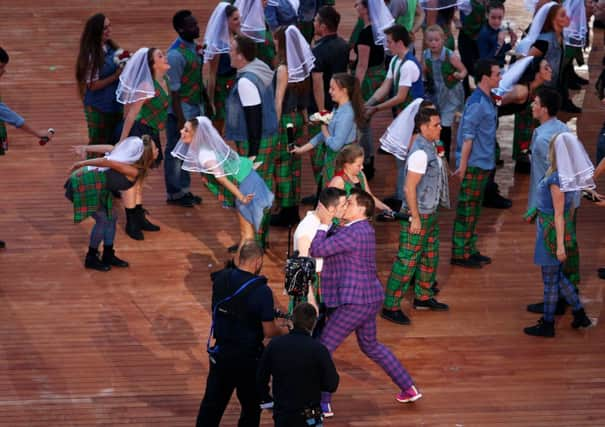Barrowman’s ‘Glasgow kiss’ hailed by campaigners


Campaigners believe the symbolic gesture made during the ceremony at Celtic Park will put pressure on the 42 Commonwealth countries where homosexuality is criminalised to improve their human rights records. The human rights abuses committed against homosexuals in many of the nations participating in the Games has received a great deal of critical comment and has been contrasted with the 2013 Commonwealth Charter which states member nations should be implacably opposed to all forms of discrimination.
Yesterday Frank Mugisha, a leading equality activist from Uganda, where homosexuals can face life-imprisonment, said the kiss had been the “highlight” of the games.
Advertisement
Hide AdAdvertisement
Hide AdMugisha, who is a 2014 nominee for the Nobel Peace Prize and a winner of the Robert F Kennedy Human Rights Award, was in Scotland for the opening ceremony and also attended a LGBTI (lesbian, gay, bisexual and transgender and intersex) Human Rights in the Commonwealth Conference in Glasgow this month.
“My highlight during my stay in Scotland was the gay kiss which was a clear message that Scotland sent out to the entire world they openly support LGBTI rights and my invitation by the Scottish Government was a clear signal Scotland is part of the global fight for LGBTI rights,” Mugisha said.
The prominence given to Barrowman’s choreographed encounter with a male dancer has been praised for putting a strong gay rights message at the heart of the games.
Mugisha said he was hopeful that the statement coming from Glasgow 2014, in front of one billion television viewers worldwide, would pressurise the Commonwealth into improving its members’ attitudes towards homosexuality.
“For me I believe the games in Scotland has opened the door for conversation on LGBTI rights with the Commonwealth. All we can hope for is that the Commonwealth takes this on,” Mugisha said.The kiss was described as a “message of love and support” to LGBTI people in the Commonwealth by Bisi Alimi, the civil rights activist who was the first Nigerian to come out on television in his homeland – a Commonwealth country where homosexuals are imprisoned or even sentenced to death in some states.
Alimi praised the opening ceremony for “challenging the stereotypes” that exist in 42 out of the 53 Commonwealth countries where homosexuality is criminalised.
“This was a challenge to the Commonwealth as an institution,” Alimi said. “When you look at how unchallenged the Commonwealth has been on the issue of sexual orientation and gender identity and the area of criminalisation and persecution – the Commonwealth has not made any political pronouncements – this sends a message through the Commonwealth.”
The activist sounded a note of caution, however, suggesting that there would be many opposed to gay rights in countries such as Uganda and Nigeria who would resent the gesture. Alimi said: “This will be seen as people, who are still seen as the main power house of the Empire, imposing their ideology on us, albeit in a very subtle way.
Advertisement
Hide AdAdvertisement
Hide Ad“I fear there might be a backlash. But the other side is we should not overlook such a celebration of such acts of love, because some people chose to act in a particular way.”
Purna Sen, who until 2011 was head of human rights for the Commonwealth Secretariat and a board member of the Kaleidoscope Trust, which supports gay rights activists in anti-homosexual nations, said the kiss was a “very bold step”.
She also acknowledged there would be those in the Commonwealth offended by the public display of affection between two men. “I suspect a lot [of the reaction] will be outrage and offence rather than we must change what we do, but part of the process of change involves that and I think that’s fine,” Sen said.
“It was a very bold step, you take that alongside the flying of the Rainbow flag and I think they are very powerful symbolic measures that have been taken. I’m very impressed. It was the first of its kind at a Commonwealth Games ceremony, it was pioneering and it will be talked about a lot.”
She added: “This will keep the issue in the public eye and on the agenda, but it takes a huge amount of other things – culture, attitude, behaviour and the law – to change.”
Earlier this month the LGBTI Human Rights conference, held in Glasgow to coincide with the Games, called for the removal of all laws that criminalise people or limit their rights due to sexual orientation or gender identity.
It also declared the historical responsibility of the British Empire for the criminalisation of same-sex sexual behaviour and relationships and called for the repeal of all British colonial laws which criminalise same-sex sexual acts between consenting adults.
Last night Tim Hopkins of the Equality Network said: “The Games opening ceremony’s ‘Glasgow kiss’ was a hugely important moment in Scotland’s equality journey. It showed Scotland is truly proud of the fact that we are now amongst the world leaders on LGBTI equality. Viewed by a global audience of hundreds of millions of people, and in the 42 Commonwealth countries that criminalise same-sex acts, the kiss demonstrated that there is another way, and that difference can be fully embraced and accepted.
Advertisement
Hide AdAdvertisement
Hide Ad“LGBTI people all over the Commonwealth are working hard to have their human rights recognised. Their governments should listen to their voices, respect their human rights and end laws that criminalise them.”
SEE ALSO